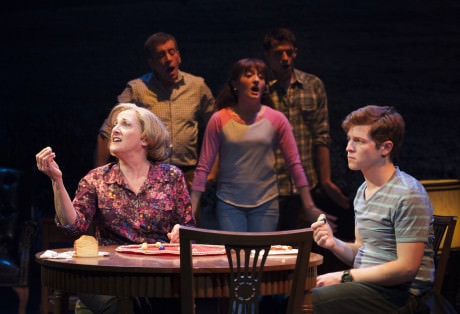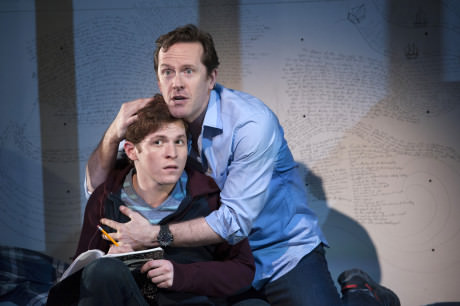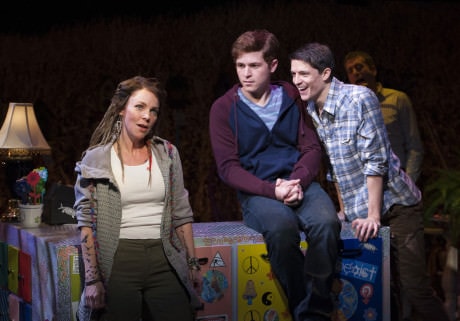
(Ensemble), Parker Drown (Ensemble), and Jake Winn (Luke) in ‘Kid Victory.’ at Signature
Theatre. Photo by Margot Schulman.
Luke’s anguished accusation is addressed to his devout and devoted Mom (Christiane Noll) and Dad (Christopher Bloch) and their fellowship circle from church, all of whom, though well meaning, are overweening in their welcome-back-Luke zeal. The kid is obviously deeply troubled, he wants to be left alone, he doesn’t want to be touched, yet they persist. The awkwardness goes off the charts when Gail (Donna Migliaccio), an overbearing amateur-shrink church lady, tries to draw Luke out in a clueless game of marbles.
It’s like trying to fix up a kid’s PTSD by piling on more trauma, and their efforts are painful to watch. But not nearly as painful as what’s to follow.
As Luke’s story unfolds over the course of two absorbing and disturbing hours, his parents and their fellow churchgoers never do find out what he has been through. Nor does anyone else on stage. Not Detective Marks (Bobby Smith), whose tactless why-didn’t-you-leave? line of inquiry adds victim blaming to Luke’s distress. Not even the lively and lovely garden shop owner Emily (Sarah Litzsinger), who hires him and befriends him. She sings a gorgeous song to him, “People Like Us,” that bonds them beautifully on the basis of their outlier lives.
But we find out. We find out exactly what happened in that missing year of Luke’s life. In fact we find out more than some audience members may wish to know (“Kid Victory contains explicit content,” cautions Signature’s web page. “Viewer discretion is advised.”) And what we finally find out is the dark heart of a brilliant and brave theatrical event, an unflinching exposé in the form of a ticking bombshell of a musical.

Theatre. Photo by Margot Schulman.
The dark pall begins to fall when we meet Michael (Jeffrey Denman), the grown man whom Luke meets anonymously online playing a boat-racing game. Luke is into boats. Really, really into boats. Kid Victory is his racing name. Michael is a cyber-savvy charmer who plays Luke by playing the game with him using the handle Yachticus9. Michael lures Luke to meet IRL/IRT, and Luke jumps at the chance. Michael seems cool. So cool that when in their first scene together the man’s hands are all over the boy, Luke doesn’t get a Creep Alert. But we sure as hell do. And as the back story of Luke’s abduction gets steadily creepier, the show splits into dual dimensions. On one level are great songs and musical numbers, entertainingly and shrewdly directed by Liesl Tommy. On another level a tension steadily builds, also Tommy’s masterful handiwork. We know Luke was not murdered (else there would be no show), but we don’t yet know whether or how he was exploited. What happened to Luke? Will he be okay? What we learn bit by bit becomes almost impossible to bear, not least because Luke’s relationship with Michael has overtones of Stockholm Syndrome.
What follows is a backhanded spoiler alert for those whom the foregoing paragraph may have scared away. Besides not being murdered, Luke was not starved or mutilated. He was not trafficked for sex. He was done no permanent bodily harm. Given the horrors that go on in the underworld of predatory pedophiles, the violence depicted onstage in Kid Victory, though shocking, is nowhere near as extreme as what headlines scream. But that does not make it Child Exploitation Lite. For victims there is no Richter Scale for measuring the relative aftershock of trauma. As Kid Victory makes clear, Luke was abused and damaged. Shattered. Changed. Made not himself anymore. And the story that Kander and Pierce devised from that precipitating situation is one of the most important-to-tell original stories ever made into a musical.
One could find holes in the story line without looking too hard. For instance the character of Dad—whose extraordinary final scene with Luke, including his exquisite solo (“Where We Are”), is the emotional showtopper—is passive and unpresent in the early scenes in a way that makes no sense, even when his reasons are eventually explained. Also there’s a scene in which Luke meets up in the woods with Andrew (Parker Drown), whom he found on a gay online dating site called Matchstick. It’s a wonderful scene, and it provides Down with an opportunity to show off his tap-dancing chops in a number called “What’s the Point?” that stops the show. It also graphically makes the point that Luke’s exploration of his homoerotic feelings is interrupted by a flashback of what happened to him at the hands or other body parts of Michael. But the scene seems to come out of nowhere, like an Obligatory Queer Interlude.
I cannot imagine that the creators meant to suggest that what Michael did to Luke made him gay, but if there were signals in the script that Luke was already not straight before his fateful encounter with Michael, they were so subtle my gaydar missed them.

Kid Victory at Signature Theatre. Photo by Margot Schulman.
So the show needs some work. But it’s a show that’s worth it.
Kid Victory is an unusual musical in that its main character, Luke, never sings. In a sense he is the caged bird for whom the entire show sings.
Depending upon one’s curiosity, compassion, and/or concern about what happens to abducted and abused kids—or perhaps simply depending upon one’s taste or tolerance for musicals that tell dark stories—Kid Victory may or may not appeal. I myself was riveted and I cannot stop thinking about what I saw. Signature Theatre’s Kid Victory is one of those shows you can’t unsee…but you must see.
Running Time: Approximately 2 hours, with no intermission.
Kid Victory plays through March 22, 2015 at Signature Theatre — 4200 Campbell Avenue, in Arlington, Virginia. For tickets, call the box office at (703) 820-9771, or purchase them online.
LINK
Read Derek Mong’s review (our other review) of Kid Victory on DCMetroTheaterArts.






I enjoyed reading your review and was particularly interested in the two examples you provided as holes in the story of Kid Victory. I attended the show earlier this week and did not come away with the same perspective. Coming from a very religious family with a domineering mother and a quiet, reserved father, I related to the “passive and unpresent father” immensely. For me, the father spoke out when Luke decided to leave because it was his “last chance” to do so.
As for the abduction turning Luke gay, my perspective is that he was questioning his sexuality before that. Given that he was “such a perfect boy” according to his mother told me that he was a typical gay boy trying to hide by being perfect. Also, when Luke and Michael were exchanging chats while racing, he asked Michael what he looked like and what he was wearing, which to me signaled flirtation. Also, the laptop and what it contained that the father decided not to give to police I took as probably gay-related content. That content would have been on the laptop before the abduction.
Stoltenberg’s review of ‘Kid Victory’ is excellent covering most aspects of this unusual musical, however, the play is multi-layered making it nearly impossible to give a complete picture of the moral, social aspects presented.
Without question there are holes in the story line, but I thought that the holes gave the audience an opportunity to fill in the blanks for themselves. As an example, just before Michael commits suicide with a revolver, he asks Luke, ‘Do you want to come with me?’ Luke declines, then Michael puts the gun to his head. Of course this scene is open to interpretation, but I saw it as an invitation from Michael to Luke to join him in death.
The play is rich in symbols both spoken and visual that adds to a highly charge emotional experience. The stage set itself presented an intriguing addition to an already complex story, with the stage divided into three separate mini sets, Michael’s home, the garden shop, and the bedroom/captive room, that allowed all the actors to move from one to the other in a continuous flow of physical performance.
As a musical, one can enjoy this play simply for the sublime music, and/or the play for itself because of the dynamic story. All aspects of this play are so perfectly meshed with one another that it becomes a seamless experience of the senses.
Eugene Markowski